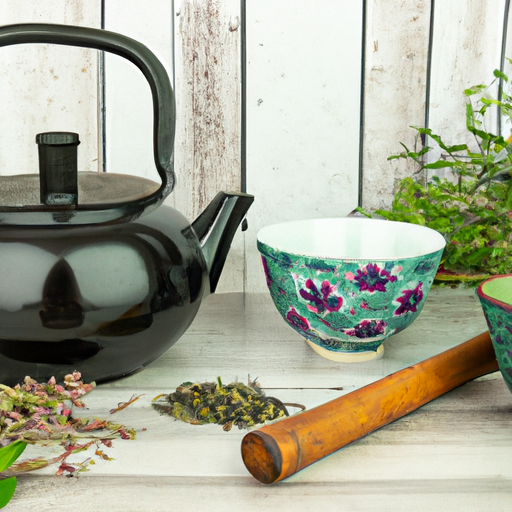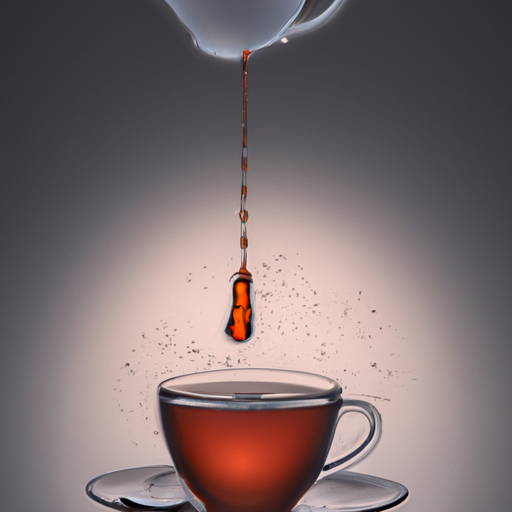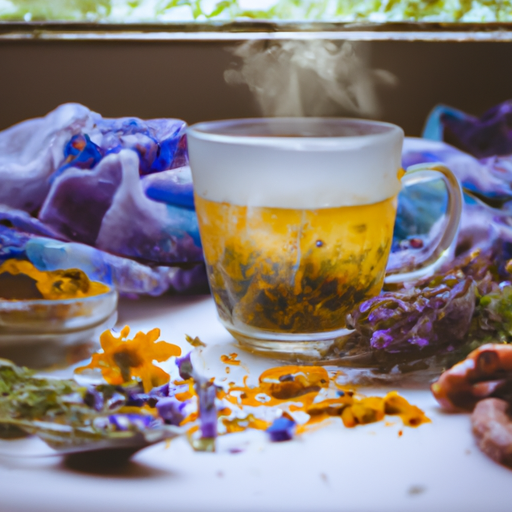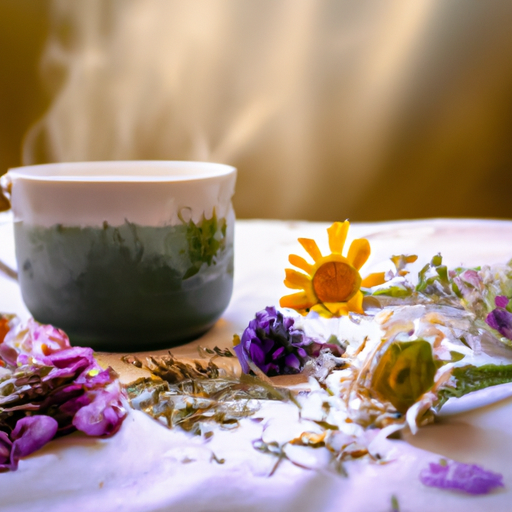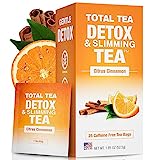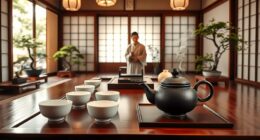As the sun gently rises, casting a warm golden glow over the world, I find solace in the comforting ritual of brewing a daily cup of herbal tea.
With every sip, I am transported to a realm of ancient wisdom and healing, where Traditional Chinese Medicine (TCM) meets the soothing embrace of nature’s bountiful herbs.
TCM herbal tea is not just a beverage, but a harmonious blend of botanical treasures carefully selected for their therapeutic properties.
In this article, I will guide you through the art of crafting your own daily herbal tea, steeped in the traditions of TCM.
We will explore the healing properties of various herbs, learn how to gather and prepare them with reverence, and create personalized blends that cater to your specific wellness needs.
So, let us embark on this journey of discovery and embrace the healing power of daily herbal tea in our lives.
Key Takeaways
- Herbal tea in Traditional Chinese Medicine (TCM) blends therapeutic herbs to restore energy and improve digestion.
- Different herbs have unique healing properties in TCM, such as chamomile for calming and reducing inflammation, peppermint for aiding digestion and relieving pain, ginger for anti-inflammatory effects and immunity boosting, and ginseng for providing energy and relieving stress.
- Gathering and preparing fresh and potent herbs is important, including harvesting herbs in the morning for peak oil levels, using sharp scissors to avoid damaged leaves, choosing pesticide-free or organic herbs, drying herbs in a well-ventilated area away from sunlight, and storing dried herbs in airtight containers.
- Brewing techniques, such as boiling water and steeping the herbal blend for 5-10 minutes, can extract maximum health benefits, and adding lemon or honey can enhance taste. Daily herbal tea supports digestion, reduces stress, and boosts immunity, with specific herbs like chamomile and lavender soothing stress and anxiety, and echinacea and elderberry improving the immune system.
Introduction to Traditional Chinese Medicine (TCM) and Herbal Tea
The introduction to TCM and herbal tea is an essential part of understanding the ancient healing practices. Traditional Chinese Medicine (TCM) is a holistic approach that focuses on balancing the body, mind, and spirit to promote overall well-being.
Herbal tea is a common practice in TCM and is known for its numerous health benefits. TCM believes that herbal tea can help restore energy, improve digestion, boost the immune system, and alleviate various ailments. The healing properties of different herbs play a crucial role in TCM practices.
For example, ginger is used to warm the body and improve circulation, while chamomile is known for its calming effects. Understanding these properties is key to creating effective herbal tea blends that cater to specific health needs.
Transitioning into the subsequent section, let’s delve into understanding the healing properties of different herbs.
Understanding the Healing Properties of Different Herbs
Explore the incredible healing properties of various herbs and experience the power they hold for your well-being. Herbal remedies have been used for centuries in Traditional Chinese Medicine (TCM) to address a wide range of health concerns. Each herb possesses unique properties that contribute to its therapeutic effects. To better understand the healing properties of different herbs, let’s take a look at the following table:
| Herb | Healing Properties | Common Uses |
|---|---|---|
| Chamomile | Calming, anti-inflammatory | Stress relief, digestion |
| Peppermint | Digestive aid, pain relief | Nausea, headaches |
| Ginger | Anti-inflammatory, immune support | Cold and flu symptoms, digestion |
| Ginseng | Energy booster, stress relief | Fatigue, mental clarity |
By incorporating these herbs into your daily herbal tea, you can harness their healing properties for improved well-being. Now, let’s move on to the next section and learn how to gather and prepare the ingredients for your daily herbal tea.
Gathering and Preparing the Ingredients
Get ready to embark on a flavorful journey as you gather and prepare the ingredients for your revitalizing herbal concoction. Here are some gathering techniques to ensure you get the freshest and most potent herbs for your tea:
- Harvest herbs early in the morning when their essential oils are at their peak.
- Use sharp scissors or pruning shears to cut herbs, avoiding any damaged or diseased leaves.
- Gather from pesticide-free gardens or purchase organic herbs to avoid harmful chemicals.
- Dry fresh herbs by hanging them upside down in a well-ventilated area, away from direct sunlight.
- Store dried herbs in airtight containers to maintain their potency and flavor.
By following these gathering techniques, you’ll ensure that your herbal tea is bursting with health benefits.
Now, let’s move on to blending your own herbal tea recipes to create a personalized and therapeutic drink.
Blending Your Own Herbal Tea Recipes
Start your flavorful journey by creating your very own personalized and therapeutic herbal tea blends. Blending your own herbal tea recipes allows you to customize flavors and harness specific health benefits.
Begin by selecting a base herb, such as chamomile or green tea, that suits your taste preferences. Then, add complementary herbs like mint, lemon balm, or lavender to enhance the flavor and aroma. Don’t forget to consider the health benefits of each herb, such as chamomile for relaxation or ginger for digestion.
Experiment with different combinations until you find the perfect balance. Once you’ve created your unique blend, you can move on to the next step of brewing and enjoying your herbal tea, where you’ll discover the art of steeping and savoring the soothing flavors.
Brewing and Enjoying Your Herbal Tea
Indulge in the art of brewing and savor the rich flavors of your personalized herbal tea blend. Brewing techniques play a vital role in extracting the maximum health benefits from your herbs.
Start by boiling water and adding it to your tea leaves or herbal blend. Steep the mixture for about 5-10 minutes to allow the flavors and medicinal properties to infuse into the water.
To enhance the taste, you can add a squeeze of lemon or a drizzle of honey. As you sip your warm cup of herbal tea, you’ll not only enjoy the delightful flavors but also reap the numerous health benefits, such as improved digestion, reduced stress, and enhanced immune function.
Transitioning into incorporating daily herbal tea into your wellness routine, discover the incredible ways it can support your overall well-being.
Incorporating Daily Herbal Tea into Your Wellness Routine
As you incorporate daily herbal tea into your wellness routine, experience the transformative power of this ancient practice on your overall well-being. The benefits of herbal tea are numerous and include improved digestion, reduced inflammation, and enhanced relaxation.
To find the right herbs for your daily tea, consider your specific health needs. For example, if you struggle with stress and anxiety, chamomile and lavender can provide soothing effects. If you’re looking to improve your immune system, echinacea and elderberry are excellent choices. Experiment with different combinations to find the flavors and benefits that resonate with you.
By making herbal tea a regular part of your routine, you’ll be nourishing your body and mind with nature’s healing powers.
In the next section, we will explore the conclusion and final thoughts on incorporating herbal tea into your daily life.
Conclusion and Final Thoughts
Incorporating daily herbal tea into your wellness routine can have a profound impact on your overall well-being, leaving you feeling nourished and rejuvenated. The benefits of drinking herbal tea daily are numerous. Not only does it provide hydration, but it also helps in detoxification, boosts the immune system, aids digestion, and promotes relaxation. Additionally, herbal teas come in a wide variety of flavors, allowing you to explore different tastes and find the ones that suit your preferences. From soothing chamomile to invigorating peppermint, there is a flavor for every mood and occasion. To give you a better idea, here is a table showcasing some popular herbal tea flavors and their associated benefits:
| Flavor | Benefits |
|---|---|
| Chamomile | Calming and aids in sleep |
| Ginger | Relieves nausea and aids digestion |
| Peppermint | Refreshing and helps with headaches |
| Echinacea | Boosts immune system |
| Rooibos | Rich in antioxidants and promotes healthy skin |
Incorporating daily herbal tea into your routine is a simple yet effective way to enhance your well-being and enjoy the numerous benefits it offers. So why not start exploring different flavors and experience the goodness of herbal tea for yourself?
Frequently Asked Questions
Are there any potential side effects or interactions with medications when drinking herbal tea?
When drinking herbal tea, there may be potential side effects and interactions with medications. It’s important to be aware of these herb-drug interactions to avoid any adverse effects.
Can I use dried herbs instead of fresh ones for making herbal tea?
Using dried herbs for herbal tea is a disaster! Fresh herbs are essential for maximum flavor and health benefits. They contain more active compounds and antioxidants. Don’t settle for less when it comes to your tea!
How long can I store the herbal tea blend before it loses its potency?
The herbal tea blend can be stored for up to six months before it starts losing its potency. However, it’s important to keep it in an airtight container, away from light and moisture to maintain its effectiveness.
Can I mix different herbal tea blends together for a more personalized taste and effect?
Sure! Mixing different herbal tea blends allows you to create personalized flavors and effects. Consider your preferences and experiment with combinations. Be mindful of the potency and potential interactions between herbs.
Are there any specific times of the day that are more beneficial for drinking herbal tea for optimum health benefits?
The best time to drink herbal tea for optimum health benefits is in the morning or before bed. Morning tea can boost energy and metabolism, while evening tea promotes relaxation and better sleep.
Conclusion
In conclusion, making daily herbal tea isn’t just a simple task—it’s a magical journey that’ll transport you to a world of healing and wellness. By understanding the healing properties of different herbs, gathering and preparing the ingredients, and blending your own recipes, you can create the perfect elixir for your health.
Brewing and enjoying your herbal tea will be a delightful ritual that’ll leave you feeling rejuvenated and refreshed. So, embark on this extraordinary adventure and let the power of herbal tea transform your well-being!

